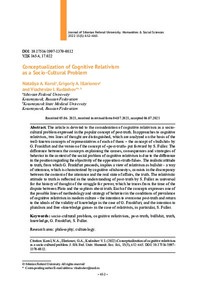Концептуализация познавательного релятивизма как социально-культурной проблемы
Скачать файл:
URI (для ссылок/цитирований):
https://elib.sfu-kras.ru/handle/2311/143762Автор:
Король, Н. А.
Илларионов, Г. А.
Кудашов, В. И.
Korol, Nataliya A.
Illarionov, Grigoriy A.
Kudashov, Viacheslav I.
Дата:
2021Журнал:
Журнал Сибирского федерального университета. Гуманитарные науки. Journal of Siberian Federal University. Humanities & Social Sciences; 2022 15 (5)Аннотация:
Статья посвящена рассмотрению познавательного релятивизма
как социально-культурной
проблемы, выражаемой в популярном концепте
постправды. В подходах к познавательному релятивизму выделяются две линии
мысли, которые анализируются на материале известных концептов представителей
каждой из них – концепте «брехня» (bullshit) Г. Франкфурта и версии концепта
«постправда», выдвигаемой С. Фуллером. Разница между концептами, объясняющими
причины, последствия и стратегии поведения в условиях общественной проблемы
познавательного релятивизма обусловлена различием в позиции относительно
объективности оппозиции «истина-ложь
». Реалистическое отношение к истине,
из которого исходит Г. Франкфурт, подразумевает взгляд на релятивизм как на брехню –
способ высказывания, которому свойственна
познавательная «недобросовестность»,
заключающаяся в несоотнесении содержания высказывания с реальным положением
дел. Релятивистское отношение к истине отражено в понимании постправды
С. Фуллером как универсальной для истории мысли борьбы за власть, которую он
отслеживает со времен спора Платона и софистов об истине. Каждый из концептов
выражает одну из возможных линий методологии и стратегии поведения в условиях
преобладания в современной культуре познавательного релятивизма – интенцию
к преодолению постправды и возврата к идеалам обоснованности знания в случае
Г. Франкфурта и интенцию к плюрализму и свободной «игре в знание» в случае
релятивистов, в частности С. Фуллера The article is devoted to the consideration of cognitive relativism as a socio-cultural problem expressed in the popular concept of post-truth. In approaches to cognitive relativism, two lines of thought are distinguished, which are analyzed on the basis of the well-known concepts of representatives of each of them – the concept of «bullshit» by G. Frankfurt and the version of the concept of «post-truth» put forward by S. Fuller. The difference between the concepts explaining the causes, consequences and strategies of behavior in the context of the social problem of cognitive relativism is due to the difference in the position regarding the objectivity of the opposition «truth-false». The realistic attitude to truth, from which G. Frankfurt proceeds, implies a view of relativism as bullshit – a way of utterance, which is characterized by cognitive «dishonesty», consists in the discrepancy between the content of the utterance and the real state of affairs, the truth. The relativistic attitude to truth is reflected in the understanding of post-truth by S. Fuller as universal for the history of thought of the struggle for power, which he traces from the time of the dispute between Plato and the sophists about truth. Each of the concepts expresses one of the possible lines of methodology and strategy of behavior in the conditions of prevalence of cognitive relativism in modern culture – the intention to overcome post-truth and return to the ideals of the validity of knowledge in the case of G. Frankfurt, and the intention to pluralism and free «knowledge game» in the case of relativists, in particular, S. Fuller

